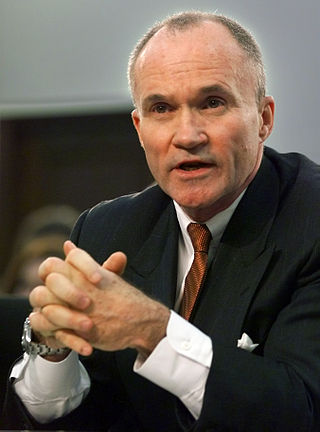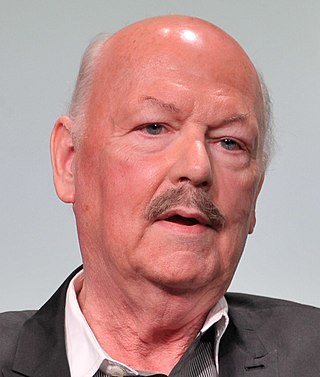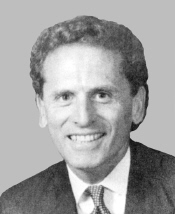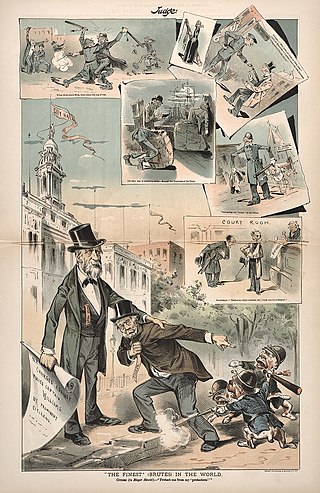Related Research Articles

The Muslim Students Association, or Muslim Student Union, of the U.S. and Canada, also known as MSA National, is a religious organization dedicated to establishing and maintaining Islamic societies on college campuses in Canada and the United States. It serves to provide coordination and support for affiliated MSA chapters in colleges across North America. Established in 1963, the organization now has chapters in colleges across the continent, and is the precursor of the Islamic Society of North America and several other Islamic organizations. The Muslim Students Association has at times been the subject of scrutiny; for example, the New York Police Department (NYPD) targeted MSAs across several US college campuses for monitoring as part of their Muslim surveillance program.

Raymond Walter Kelly is the longest-serving Commissioner in the history of the New York City Police Department (NYPD) and the first person to hold the post for two non-consecutive tenures. According to its website, Kelly, a lifelong New Yorker, had spent 45 years in the NYPD, serving in 25 different commands and as Police Commissioner from 1992 to 1994 and again from 2002 until 2013. Kelly was the first man to rise from Police Cadet to Police Commissioner, holding all of the department's ranks, except for Three-Star Bureau Chief, Chief of Department and Deputy Commissioner, having been promoted directly from Two-Star Chief to First Deputy Commissioner in 1990. After his handling of the World Trade Center bombing in 1993, he was mentioned for the first time as a possible candidate for FBI Director. After Kelly turned down the position, Louis Freeh was appointed.
In the United States, Red Squads were police intelligence units that specialized in infiltrating, conducting counter-measures and gathering intelligence on political and social groups during the 20th century. Dating as far back as the Haymarket Riot in 1886, Red Squads became common in larger cities such as Chicago, New York, and Los Angeles during the First Red Scare of the 1920s. They were set up as specialized units of city police departments, as a weapon against labor unions, communists, anarchists, and other dissidents.
The Handschu agreement is a set of guidelines that regulate police behavior in New York City with regard to political activity.

James Bamford is an American author, journalist and documentary producer noted for his writing about United States intelligence agencies, especially the National Security Agency (NSA). The New York Times has called him "the nation's premier journalist on the subject of the National Security Agency" and The New Yorker named him "the NSA's chief chronicler."

William John Martini is a senior United States district judge of the United States District Court for the District of New Jersey, having been in active service from November 14, 2002, to February 10, 2015. Martini is one of twenty-four judges seated on the New Jersey District Court, and his highest profile case to date was the corruption trial for former Newark Mayor Sharpe James.
Barbara Ellen Handschu is an American political activist and lawyer, whose surname was memorialized on a set of federal guidelines "[ordering] restrictions on police surveillance ... signed by the city [of New York] in 1985", which became known as the Handschu decree.
This is a list of activities carried out by the U.S. Central Intelligence Agency in China.

Throughout the history of the New York City Police Department, numerous instances of corruption, misconduct, and other allegations of such, have occurred. Over 12,000 cases have resulted in lawsuit settlements totaling over $400 million during a five-year period ending in 2014. In 2019, taxpayers funded $68,688,423 as the cost of misconduct lawsuits, a 76 percent increase over the previous year, including about $10 million paid out to two exonerated individuals who had been falsely convicted and imprisoned.

William "Bill" Edward Binney is a former intelligence official with the United States National Security Agency (NSA) and whistleblower. He retired on October 31, 2001, after more than 30 years with the agency.

The practice of mass surveillance in the United States dates back to wartime monitoring and censorship of international communications from, to, or which passed through the United States. After the First and Second World Wars, mass surveillance continued throughout the Cold War period, via programs such as the Black Chamber and Project SHAMROCK. The formation and growth of federal law-enforcement and intelligence agencies such as the FBI, CIA, and NSA institutionalized surveillance used to also silence political dissent, as evidenced by COINTELPRO projects which targeted various organizations and individuals. During the Civil Rights Movement era, many individuals put under surveillance orders were first labelled as integrationists, then deemed subversive, and sometimes suspected to be supportive of the communist model of the United States' rival at the time, the Soviet Union. Other targeted individuals and groups included Native American activists, African American and Chicano liberation movement activists, and anti-war protesters.

The New York Police Department's Strategic Response Group (SRG) is a unit of the New York City Police Department (NYPD) formed in 2015 for counter-terrorism and the policing of political protests. They maintain a bike squadron and are outfitted with anti-riot gear, rifles, and body armor. The unit has been criticized for its use of excessive force and mass arrests against political demonstrators protected under the First Amendment, disproportionately high numbers of complaints to the Civilian Complaint Review Board, and the killing of unarmed men, among other things. Activists, the New York City Council, the New York City Department of Investigation, and organizations such as Human Rights Watch and the New York Civil Liberties Union, among others, have called for its regulation or disbandment.
Federal Bureau of Investigation v. Fazaga, 595 U.S. ___ (2022), was a United States Supreme Court case dealing with the use of law enforcement surveillance under the Foreign Intelligence Surveillance Act (FISA) of 1978 and the state secrets privilege defense. The case stems from a 2011 class action lawsuit filed against the Federal Bureau of Investigation (FBI) related to one of its surveillance operations. In August 2012, the district court dismissed the case on the basis of the FBI's invocation of state secrets privilege. The Ninth Circuit overturned this ruling in part in 2019, ruling that FISA precluded the defendants from invoking the state secrets defense. However, the Supreme Court overturned the Ninth Circuit’s ruling in a unanimous decision in March 2022, stating that FISA does not override the state secrets defense.
Lawrence 'Larry' Sanchez is a former Central Intelligence Agency officer and security consultant. After the September 11 attacks he was seconded by the CIA to the New York City Police Department where he helped establish a controversial program for surveillance of the city's Muslim population.
Eileen Sullivan is an American journalist who has covered counter-terrorism and national security for The Associated Press and The New York Times. She won a Pulitzer Prize for Investigative Reporting in 2012.

The New York City Police Department (NYPD) actively monitors public activity in New York City, New York, United States. Historically, surveillance has been used by the NYPD for a range of purposes, including against crime, counter-terrorism, and also for nefarious or controversial subjects such as monitoring political demonstrations, activities, and protests, and even entire ethnic and religious groups.

The New York City Police Department Intelligence Bureau is a division of the New York City Police Department (NYPD) which claims responsibility for the detection and disruption of criminal and terrorist activity through the use of intelligence-led policing. There is limited oversight over the Intelligence Bureau, and it conducts work in secrecy without the city council being informed of operations.

Islam is the third most widely professed religion in New York City, after Christianity and Judaism. A 2018 study estimated that there are over 750,000 Muslims living in New York City, the largest population of Muslims by city in the United States. Approximately 9% of New York City residents are Muslim, constituting 22.3% of American Muslims, with 1.5 million Muslims in the greater New York metropolitan area, representing the largest metropolitan Muslim population in North America—and the most ethnically diverse Muslim population of any city in the world.
Kunstler v. Central Intelligence Agency is a lawsuit against the Central Intelligence Agency, former CIA Director Mike Pompeo, Undercover Global S.L., and David Morales Guillen filed by a group of American lawyers and journalists associated with WikiLeaks founder Julian Assange. The lawsuit alleges that the CIA violated their constitutional rights by recording their conversations with Assange and copying their phones and computers after suspicions were raised that Assange was working for the Russian intelligence services.
After Julian Assange was granted asylum and entered the Ecuadorian embassy in London, new CCTV cameras were installed and security personnel working for UC Global and Promsecurity recorded his daily activities and interactions with staff and visitors, including his legal team. In a 2017 email, the surveillance was explained with suspicions that Assange was "working for the Russian intelligence services." New cameras with microphones were installed in December 2017, and the installation of microphones in fire extinguishers and the women's bathroom was ordered. Other microphones were installed in decorations in the embassy. Morales arranged for the United States to have immediate access to the recordings. The embassy staff had removed the toilet in the women's bathroom in June 2012 at Assange's request so he could sleep in the quiet room, which he also used to meet with his lawyers.
References
- ↑ Staff, newsone (2011-08-24). "NYPD And CIA Had Secret "Mosque Crawlers" Operation". NewsOne. Retrieved 2023-11-03.
- ↑ "'Mosque Crawlers,' 'Rakers' Monitoring U.S. Muslims for NYPD". PBS NewsHour. 2012-02-28. Retrieved 2023-11-03.
- ↑ "With cameras, informants, NYPD eyed mosques". Associated Press. 2012-02-23. Retrieved 2023-11-03.
- 1 2 3 Moynihan, Colin (2016-01-07). "A New York City Settlement on Surveillance of Muslims". The New Yorker. ISSN 0028-792X . Retrieved 2023-11-03.
- 1 2 "NYPD's spying programs produce mixed results - CBS News". www.cbsnews.com. 2011-12-23. Retrieved 2023-11-03.
- ↑ Pilkington, Ed (2018-04-05). "NYPD settles lawsuit after illegally spying on Muslims". The Guardian. ISSN 0261-3077 . Retrieved 2023-11-03.
- ↑ Blenner, Aimee (2014). "Watch out: You're Being Watched (If You're Muslim)" (PDF). Rutgers Journal of Law and Religion.
- ↑ "NYPD secretly labels mosques as terror groups and spies on them". The Guardian. Associated Press. 2013-08-28. ISSN 0261-3077 . Retrieved 2023-11-03.
- ↑ "The NYPD Has Disbanded Its Most Notorious Spy Unit, but Is the Age of Muslim Surveillance Really Over? | The Nation". 2016-05-27. Archived from the original on 2016-05-27. Retrieved 2023-11-03.